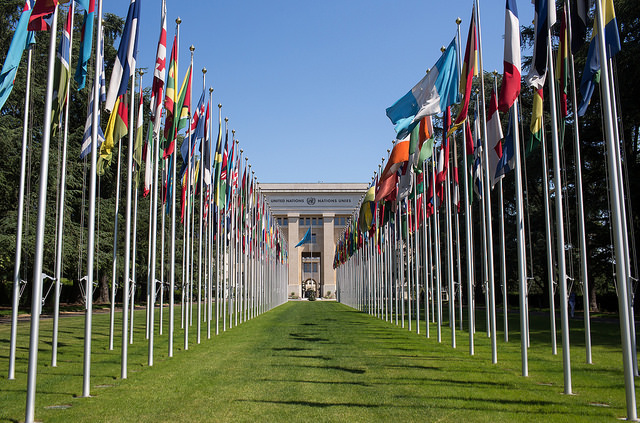2018 Universal Periodic Review of China
China underwent its third Universal Periodic Review (UPR) at the United Nations in Geneva on Tuesday, November 6, 2018. The review took place in the context of a mounting volume of reports since 2017 on the massive internment of ethnic Uyghur Muslims in Xinjiang—estimated at 1 million, out of the area’s total Uyghur population of 11 million—into what the authorities call “re-education” camps. In August 2018, when questioned about the detention and the camps during China’s review by the UN Committee on the Elimination of Racial Discrimination (CERD), Chinese officials flatly denied the existence of these camps. In October, Chinese authorities admitted that the camps do exist but justified them as “vocational training centers” where “thought transformation” is conducted to combat extremism. Reports in September and October 2018 further indicate that a campaign is underway to transport Uyghur detainees out of Xinjiang into other regions of China, and to transport inmates from prisons elsewhere in China into Xinjiang.
Since China’s last UPR in 2013, the human rights situation in China has significantly worsened. Developments include the following:
- A large-scale crackdown in 2015 on lawyers and legal advocates has silenced many prominent rights defense lawyers—through prosecution, imprisonment, torture in detention (including forced feeding of psychiatric medications), disappearance; many families were harassed;
- The Law on Management of Foreign Non-Governmental Organizations in the Territory of Mainland China《境外非政府组织境内活动管理法》(the FNGO Law), in effect since January 2017, has severely curtailed foreign NGOs’ role in supporting civil society organizations in China.
- The National Security Law (effective July 2015), with a overbroad and vague definition of national security, requires authorities to scrutinize virtually all activities in society under the lens of “national security”;
- The Cybersecurity Law (effective June 2017) and a host of implementing regulations (July 2017-January 2018) have steeply escalated control over online information flow, holding all parties involved— users, public account administrators, service providers, as well as critical infrastructure operators—responsible for contents deemed “unacceptable” by the authorities;
- A “social credit system” is being implemented nationwide to keep in check citizens’ behavior that includes a centralized database (Credit China) and local government listings of the conduct of citizens, enterprises, and organizations—promising rewards for “good” behavior, and punishment and public shaming for “bad” behavior;
- In March 2018, through constitutional amendments, the term limit (two five-year terms) for the presidency was lifted, and ‘Xi Jinping Thought on Socialism with Chinese Characteristics for a New Era’ was written into the country’s constitution, allowing Xi Jinping to remain president for life;
- Since the constitutional amendments, the authorities have intensified a campaign to require all state institutions (including the courts), professional sectors (legal, academic, news and media, business, etc.), and all of civil society to submit to the Communist Party of China and its ideology as the guiding authority in all of their work and deeds.
- On the international stage, China has escalated its challenge of the core principle of the international system: the universality of human rights and respect for human dignity. Instead, it advocates for the localization of human rights, and has successfully led the passage of a resolution at the Human Rights Council that replaced state accountability for protecting human rights with a model that centers on “cooperation among states.”
As of October 30, twenty-three UN member states have submitted their advanced questions to China.
See more information on China’s UPR: https://www.ohchr.org/EN/HRBodies/UPR/Pages/CNindex.aspx
Other Resources
Related media coverage
- Reuters, “Activists urge deep scrutiny of China at U.N. rights gathering this week,” November 4, 2018
- ANI News, “China failed to implement UN recommendations on human rights, says activists,” November 3, 2018
- ANI News, “Activists, scholars raise concern over China’s failure to protect human rights,” November 3, 2018
- HRIC report: Stakeholder Submission to the Human Rights Council in Advance of the Third Universal Periodic Review of the People’s Republic of China (March 2018): EN, CH
- HRIC Bulletin:
- HRIC report: “The China Challenge to International Human Rights: What’s At Stake? A UPR Mid-Term Progress Assessment by Human Rights in China,” (November 2016): (EN, CH)
China and the United Nations
